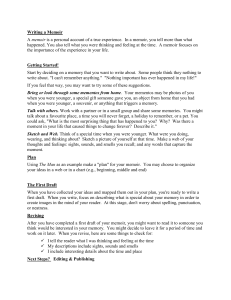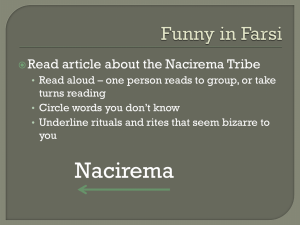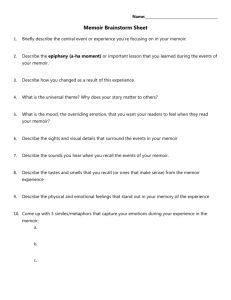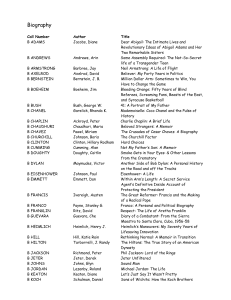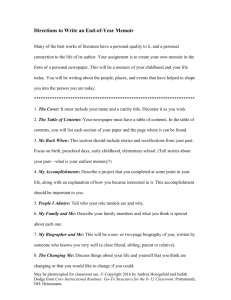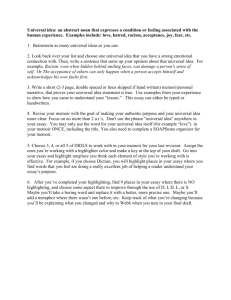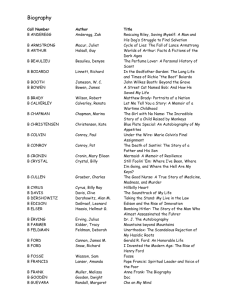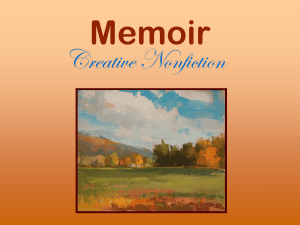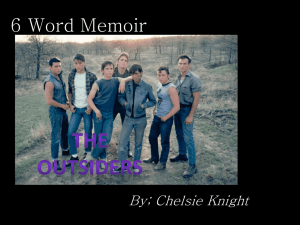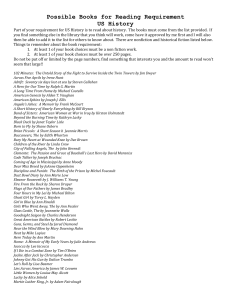Memoir Titles to Choose From 2012
advertisement
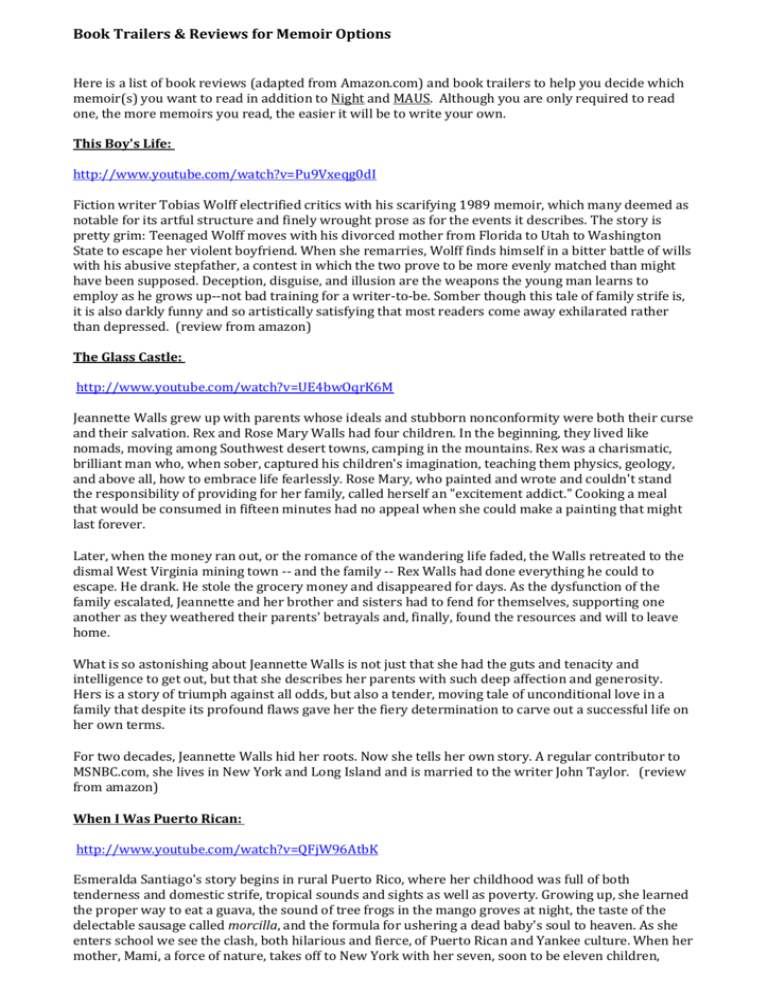
Book Trailers & Reviews for Memoir Options Here is a list of book reviews (adapted from Amazon.com) and book trailers to help you decide which memoir(s) you want to read in addition to Night and MAUS. Although you are only required to read one, the more memoirs you read, the easier it will be to write your own. This Boy's Life: http://www.youtube.com/watch?v=Pu9Vxeqg0dI Fiction writer Tobias Wolff electrified critics with his scarifying 1989 memoir, which many deemed as notable for its artful structure and finely wrought prose as for the events it describes. The story is pretty grim: Teenaged Wolff moves with his divorced mother from Florida to Utah to Washington State to escape her violent boyfriend. When she remarries, Wolff finds himself in a bitter battle of wills with his abusive stepfather, a contest in which the two prove to be more evenly matched than might have been supposed. Deception, disguise, and illusion are the weapons the young man learns to employ as he grows up--not bad training for a writer-to-be. Somber though this tale of family strife is, it is also darkly funny and so artistically satisfying that most readers come away exhilarated rather than depressed. (review from amazon) The Glass Castle: http://www.youtube.com/watch?v=UE4bwOqrK6M Jeannette Walls grew up with parents whose ideals and stubborn nonconformity were both their curse and their salvation. Rex and Rose Mary Walls had four children. In the beginning, they lived like nomads, moving among Southwest desert towns, camping in the mountains. Rex was a charismatic, brilliant man who, when sober, captured his children's imagination, teaching them physics, geology, and above all, how to embrace life fearlessly. Rose Mary, who painted and wrote and couldn't stand the responsibility of providing for her family, called herself an "excitement addict." Cooking a meal that would be consumed in fifteen minutes had no appeal when she could make a painting that might last forever. Later, when the money ran out, or the romance of the wandering life faded, the Walls retreated to the dismal West Virginia mining town -- and the family -- Rex Walls had done everything he could to escape. He drank. He stole the grocery money and disappeared for days. As the dysfunction of the family escalated, Jeannette and her brother and sisters had to fend for themselves, supporting one another as they weathered their parents' betrayals and, finally, found the resources and will to leave home. What is so astonishing about Jeannette Walls is not just that she had the guts and tenacity and intelligence to get out, but that she describes her parents with such deep affection and generosity. Hers is a story of triumph against all odds, but also a tender, moving tale of unconditional love in a family that despite its profound flaws gave her the fiery determination to carve out a successful life on her own terms. For two decades, Jeannette Walls hid her roots. Now she tells her own story. A regular contributor to MSNBC.com, she lives in New York and Long Island and is married to the writer John Taylor. (review from amazon) When I Was Puerto Rican: http://www.youtube.com/watch?v=QFjW96AtbK Esmeralda Santiago's story begins in rural Puerto Rico, where her childhood was full of both tenderness and domestic strife, tropical sounds and sights as well as poverty. Growing up, she learned the proper way to eat a guava, the sound of tree frogs in the mango groves at night, the taste of the delectable sausage called morcilla, and the formula for ushering a dead baby's soul to heaven. As she enters school we see the clash, both hilarious and fierce, of Puerto Rican and Yankee culture. When her mother, Mami, a force of nature, takes off to New York with her seven, soon to be eleven children, Esmeralda, the oldest, must learn new rules, a new language, and eventually take on a new identity. In this first volume of her much-praised, bestselling trilogy, Santiago brilliantly recreates the idyllic landscape and tumultuous family life of her earliest years and her tremendous journey from the barrio to Brooklyn, from translating for her mother at the welfare office to high honors at Harvard. (from amazon) Open: http://www.youtube.com/watch?v=JBvXb8Ly2hQ “Fascinating. . . . Inspiring. . . . Open describes Agassi’s personal odyssey with brio and unvarnished candor. . . . [Agassi’s] career-comeback tale is inspiring but even more so is another Open storyline. It could be called: The punk grows up. . . . Countless athletes start charitable foundations, but frequently the organizations are just tax shelters or PR stunts. For Agassi helping others has instead become his life’s calling. . . . Open is a superb memoir, but it hardly closes the books on an extraordinary life.” —The Wall Street Journal “Honest in a way that such books seldom are. . . . An uncommonly well-written sports memoir. . . . Bracingly devoid of triumphalist homily, Agassi’s is one of the most passionately anti-sports books ever written by a superstar athlete.” —The New York Times “Not your typical jock-autobio fare. This literate and absorbing book is, as the title baldly states, Agassi’s confessional, a wrenching chronicle of his lifelong search for identity and serenity, on and off the court.” —Los Angeles Times Falling Leaves: The Story of an Unwanted Chinese Daughter: http://www.youtube.com/watch?v=ygqz5twXk0A Snow White's stepmother looks like a pussycat compared to the monster under which Adeline Yen Mah suffered. The author's memoir of life in mainland China and--after the 1949 revolution--Hong Kong is a gruesome chronicle of nonstop emotional abuse from her wealthy father and his beautiful, cruel second wife. Chinese proverbs scattered throughout the text pithily covey the traditional world view that prompted Adeline's subservience. Had she not escaped to America, where she experienced a fulfilling medical career and a happy marriage, her story would be unbearable; instead, it's grimly fascinating: Falling Leaves is an Asian Mommie Dearest. (review from amazon) Black Boy: http://www.youtube.com/watch?v=USn3Y1BZDqM Autobiography by Richard Wright, published in 1945 and considered to be one of his finest works. The book is sometimes considered a fictionalized autobiography or an autobiographical novel because of its use of novelistic techniques. Black Boy describes vividly Wright's often harsh, hardscrabble boyhood and youth in rural Mississippi and in Memphis, Tenn. When the work was first published, many white critics viewed Black Boy primarily as an attack on racist Southern white society. From the 1960s the work came to be understood as the story of Wright's coming of age and development as a writer whose race, though a primary component of his life, was but one of many that formed him as an artist. -- The Merriam-Webster Encylopedia of Literature A Hole in My Life: http://www.youtube.com/watch?v=JY3Jf4PskvU&feature=related The compelling story of the author's final year in high school, his brushes with crime, and his subsequent incarceration. Gantos has written much about his early years with his eccentric family, and this more serious book picks up the tale as they moved to Puerto Rico during his junior year. He returned to Florida alone, living in a seedy motel while he finished high school and realized that his options for college weren't great. A failed drug deal cost him most of his savings and he joined his family, now in St. Croix, where he accepted an offer of $10,000 to help sail a boat full of hash to New York. He and his colleagues were caught, and as it turns out, he was in more trouble than he anticipated. Sent to federal prison for up to six years, Gantos landed a job in the hospital section, a post that protected him from his fellow inmates, yet allowed him to witness prison culture firsthand. Much of the action in this memoir-some of it quite raw and harsh-will be riveting to teen readers. However, the book's real strength lies in the window it gives into the mind of an adolescent without strong family support and living in the easy drug culture of the 1970s. Gantos looks for role models and guidance in the pages of the books he is reading, and his drive to be a writer and desire to go to college ultimately save him. -Barbara Scotto, Michael Driscoll School, Brookline, MA Copyright 2002 Cahners Business Information, Inc. Kaffir Boy: http://www.youtube.com/watch?v=XoUWIconiA4 Mark Mathabane was weaned on devastating poverty and schooled in the cruel streets of South Africa's most desperate ghetto, where bloody gang wars and midnight police raids were his rites of passage. Like every other child born in the hopelessness of apartheid, he learned to measure his life in days, not years. Yet Mark Mathabane, armed only with the courage of his family and a hard-won education, raised himself up from the squalor and humiliation to win a scholarship to an American university. This extraordinary memoir of life under apartheid is a triumph of the human spirit over hatred and unspeakable degradation. For Mark Mathabane did what no physically and psychologically battered "Kaffir" from the rat-infested alleys of Alexandra was supposed to do -- he escaped to tell about it. (review from amazon) personal face to the brutality of civil war, squalor, and the struggle for survival. A few critics questioned where Deng's story ended and Eggers's literary license began, and the book as a whole could have been better edited. While visceral and heartrending, Deng's and Eggers's joint story is ultimately a powerful tale of hope. When both People and the ever-glum Michiko Kakutani of the New York Times rave, how can one resist? (review from amazon) The Things They Carried "They carried all the emotional baggage of men who might die. Grief, terror, love, longing--these were intangibles, but the intangibles had their own mass and specific gravity, they had tangible weight. They carried shameful memories. They carried the common secret of cowardice.... Men killed, and died, because they were embarrassed not to." A finalist for both the 1990 Pulitzer Prize and the National Book Critics Circle Award, The Things They Carried marks a subtle but definitive line of demarcation between Tim O'Brien's earlier works about Vietnam, the memoir If I Die in a Combat Zone and the fictional Going After Cacciato, and this sly, almost hallucinatory book that is neither memoir nor novel nor collection of short stories but rather an artful combination of all three. Vietnam is still O'Brien's theme, but in this book he seems less interested in the war itself than in the myriad different perspectives from which he depicts it. Whereas Going After Cacciato played with reality, The Things They Carried plays with truth. The narrator of most of these stories is "Tim"; yet O'Brien freely admits that many of the events he chronicles in this collection never really happened. He never killed a man as "Tim" does in "The Man I Killed," and unlike Tim in "Ambush," he has no daughter named Kathleen. But just because a thing never happened doesn't make it any less true. In "On the Rainy River," the character Tim O'Brien responds to his draft notice by driving north, to the Canadian border where he spends six days in a deserted lodge in the company of an old man named Elroy while he wrestles with the choice between dodging the draft or going to war. The real Tim O'Brien never drove north, never found himself in a fishing boat 20 yards off the Canadian shore with a decision to make. The real Tim O'Brien quietly boarded the bus to Sioux Falls and was inducted into the United States Army. But the truth of "On the Rainy River" lies not in facts but in the genuineness of the experience it depicts: both Tims went to a war they didn't believe in; both considered themselves cowards for doing so. Every story in The Things They Carried speaks another truth that Tim O'Brien learned in Vietnam; it is this blurred line between truth and reality, fact and fiction, that makes his book unforgettable. --Alix Wilber (review from amazon) Stitches (Graphic Novel) http://www.youtube.com/watch?v=0i-_9lo2ICM Amazon Best of the Month, September 2009: Reading Stitches may feel unexpectedly familiar. Not in the details of its story--which is David Small's harrowing account of growing up under the watchless eyes of parents who gave him cancer (his radiologist father subjected him to unscrupulous x-rays for minor ailments) and let it develop untreated for years--but in delicate glimpses of the author's child'seye view, sketched most often with no words at all. Early memories (and difficult ones, too) often seem less like words than pictures we play back to ourselves. That is what's recognizable and, somehow, ultimately delightful in the midst of this deeply sad story: it reminds us of our memories, not just what they are, but what they look like. In every drawing, David Small shows us moments both real and imagined—some that are guileless and funny and wonderfully sweet, many others that are dark and fearful—that unveil a very talented artist, stitches and all. --Anne Bartholomew The Complete Persepolis by Marjane Satrapi (Graphic Novel) Persepolis is Marjane Satrapi's wise, funny, and heartbreaking memoir of growing up in Iran during the Islamic Revolution. In powerful black-and-white comic strip images, Satrapi tells the story of her life in Tehran from ages six to fourteen, years that saw the overthrow of the Shah's regime, the triumph of the Islamic Revolution, and the devastating effects of war with Iraq. The intelligent and outspoken only child of committed Marxists and the great-granddaughter of one of Iran's last emperors, Marjane bears witness to a childhood uniquely entwined with the history of her country. ~ Publisher’s description "A memoir of growing up as a girl in revolutionary Iran, Persepolis provides a unique glimpse into a nearly unknown and unreachable way of life... That Satrapi chose to tell her remarkable story as a gorgeous comic book makes it totally unique and indispensable." –Time What Is the What: The Autobiography of Valentino Achak Deng Valentino Achak Deng, real-life hero of this engrossing epic, was a refugee from the Sudanese civil war-the bloodbath before the current Darfur bloodbath-of the 1980s and 90s. In this fictionalized memoir, Eggers (A Heartbreaking Work of Staggering Genius) makes him an icon of globalization. Separated from his family when Arab militia destroy his village, Valentino joins thousands of other "Lost Boys," beset by starvation, thirst and man-eating lions on their march to squalid refugee camps in Ethiopia and Kenya, where Valentino pieces together a new life. He eventually reaches America, but finds his quest for safety, community and fulfillment in many ways even more difficult there than in the camps: he recalls, for instance, being robbed, beaten and held captive in his Atlanta apartment. Eggers's limpid prose gives Valentino an unaffected, compelling voice and makes his narrative by turns harrowing, funny, bleak and lyrical. The result is a horrific account of the Sudanese tragedy, but also an emblematic saga of modernity-of the search for home and self in a world of unending upheaval. The Absolutely True Diary of a Part-Time Indian: http://www.youtube.com/watch?v=Vo4fNMfPxq4&feature=related Exploring Indian identity, both self and tribal, Alexie's first young adult novel is a semiautobiographical chronicle of Arnold Spirit, aka Junior, a Spokane Indian from Wellpinit, WA. The bright 14-year-old was born with water on the brain, is regularly the target of bullies, and loves to draw. He says, "I think the world is a series of broken dams and floods, and my cartoons are tiny little lifeboats." He expects disaster when he transfers from the reservation school to the rich, white school in Reardan, but soon finds himself making friends with both geeky and popular students and starting on the basketball team. Meeting his old classmates on the court, Junior grapples with questions about what constitutes one's community, identity, and tribe. The daily struggles of reservation life and the tragic deaths of the protagonist's grandmother, dog, and older sister would be all but unbearable without the humor and resilience of spirit with which Junior faces the world. The many characters, on and off the rez, with whom he has dealings are portrayed with compassion and verve, particularly the adults in his extended family. Forney's simple pencil cartoons fit perfectly within the story and reflect the burgeoning artist within Junior. Reluctant readers can even skim the pictures and construct their own story based exclusively on Forney's illustrations. The teen's determination to both improve himself and overcome poverty, despite the handicaps of birth, circumstances, and race, delivers a positive message in a low-key manner. Alexie's tale of self-discovery is a first purchase for all libraries.—Chris Shoemaker, New York Public Library Additional Titles to choose from: Humorous Holidays on Ice: by David Sedaris Running with Scissors by Augusten Burroughs The Life and Times of the Thunderbolt Kid by Bill Bryson Too Close to the Falls by Catherine Gildiner Half Broke Horses: Jeannette Walls The Immigrant Experience Brother, I’m Dying by Edwidge Danticat Waiting for Snow in Havana by Carlos Eire Lipstick Jihad: A Memoir of Growing up Iranian in America and American in Iran by Azadeh Moaveni The Jade Peony by Wayson Choy House on Mango Street by Sandra Cisera Horrible Childhoods and Family Dramas Angela’s Ashes by Frank McCourt Borrowed Finery by Paula Fox Jesus Land: A Memoir by Julia Scheeres Meant to Be: The True Story of a Son Who Discovers He Is His Mother's Deepest Secret by Walter Anderson The Liar’s Cub by Mary Karr The Burn Journals by Brent Runyon A Child Called It by Dave Pelzer Celebrities and Sports Figures Open – Andre Agassi Dreams From My Father: A Story of Race and Inheritance by Barack Obama Swimming to Antarctica: Tales of a Long-Distance Swimmer by Lynne Cox It’s Not About the Bike: My Journey Back to Life by Lance Armstrong Dispatches from the Edge: A Memoir of War, Disasters, and Survival by Anderson Cooper Wartime experiences The Land I Lost – Kim A Long Way Gone: Memoirs of a Boy Soldier by Ishmael Beah Night Elie Wiesel (any student who read this in English 9 can not count it as one of your 3 memoirs but obviously it can referred to throughout our study). Personal identity Autobiography of a Face by Lucy Grealy The Color of Water by James McBride Look Me in the Eye: My Life with Asperger's by John Elder Robinson Black Ice by Lorene Cary Girl, Interrupted by Susanna Kaysen Born On A Blue Day: Inside the Extraordinary Mind of an Autistic Savant by Daniel Tammet Inspiring Journeys and Lessons Learned Three Cups of Tea Greg Mortenson & David Oliver Relin Mao’s Last Dancer by Li Cunxin Into Thin Air; Jon Krakauer Hole in My Life by Jack Gantos Burned Alive: A Survivor of an "Honor Killing" Speaks Out by Souad Riding the Bus with my Sister by Rachel Simon Recommendation from family/friends/the library……
